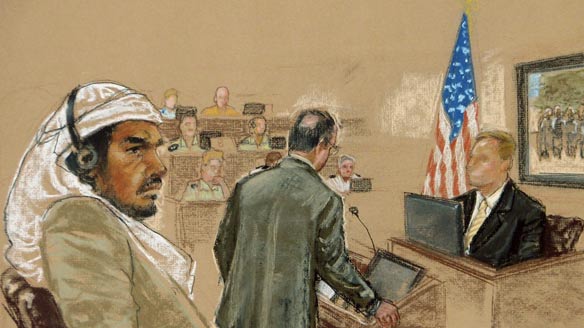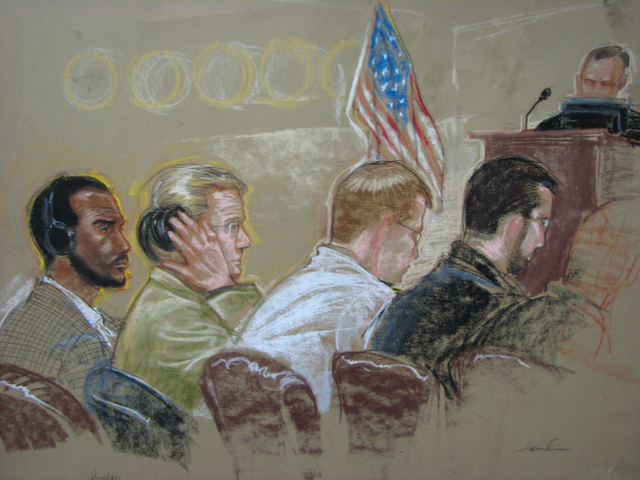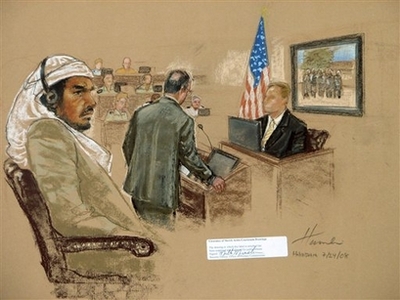Hamdan Conviction Overturned Years Too Late For Hamdan
Osama's driver, who was convicted of only technical crimes, has had his conviction overturned on a technicality.
Salim Ahmed Hamdan, who spent years in prison only to be convicted of a very minor terrorism-related crime, has had his conviction overturned years after his time was served.
NYT (“Appeals Court Overturns Terrorism Conviction of Bin Laden’s Driver“):
A federal appeals court on Friday overturned the terrorism conviction of Salim Ahmed Hamdan, a former driver and bodyguard for Osama bin Laden whose case has been one of the most tangled to emerge from the war crimes trials of detainees held by the military at Guantánamo Bay, Cuba.
The court found that Mr. Hamdan’s conviction by a military commission for providing material support for terrorism could not stand because, under the international law of war in effect at the time of his actions, there was no such defined war crime.
The Military Commission Act, a law passed in 2006, does not authorize such retroactive prosecutions, a three-judge panel of the United States Court of Appeals for the District of Columbia Circuit ruled.
The case of Mr. Hamdan, once considered a dangerous terrorist by the Bush administration, forced Congress to pass that 2006 statute in the first place.
Lawyers for Mr. Hamdan, a Yemeni who was captured in Afghanistan in 2001, had challenged his detention and won a landmark Supreme Court case in 2006 that found the military commission system for prosecuting war crimes unconstitutional and in violation of American military law and the Geneva Conventions. That forced Congress to rewrite the rules, leading to Mr. Hamdan’s trial and conviction in 2008. Because he had already served so long in prison, he was released later that year to Yemen, his home country.
ThinkProgress’ Hayes Brown notes how incredibly narrow the ruling is:
In deciding Hamdan’s appeal, the District Court found that as “material support” was not viewed as a war crime under international law at the time of the passing of the Military Commissions Act — along with the Act’s inability to apply to actions taken in 2001 — the conviction must be vacated.
While the court has overturned this specific conviction, the ruling is unlikely to apply to many other trials either currently under way or completed. Of the cases heard by military tribunal at Guantanamo Bay, as compiled by Human Rights Watch, only one other deals solely with the crime of material support. That defendant, Ibrahim al-Qosi, was convicted after confessing to serving as a driver and cook for bin Laden, but has since been released to Sudan. All other cases involve acts such as attempted murder and conspiracy to commit terrorism.
Moreover, Brown notes, the court’s ruling includes the mother of all caveats:
Our judgment would not preclude detention of Hamdan until the end of U.S. hostilities against al Qaeda. Nor does our judgment preclude any future military commission charges against Hamdan – either for conduct prohibited by the “law of war” under 10 U.S.C. § 821 or for any conduct since 2006 that has violated the Military Commissions Act. Nor does our judgment preclude appropriate criminal charges in civilian court. Moreover, our decision concerns only the commission’s legal authority. We do not have occasion to question that, as a matter of fact, Hamdan engaged in the conduct for which he was convicted.
Regardless, Hamdan is a free man. Of course, he’s been a free man since 2009.
While Hamdan’s original case, which made it all the way to the Supreme Court, established technical limitations on the US government’s powers over those it accuses of terrorism-related crimes, the fact of the matter is that there are few practical limitations. In reality, these people exist in a netherworld between enemy prisoners of war and accused criminals. Unless and until we declare the war against terrorism–or whatever it is that we’re calling it these days–over, we can lock these people up indefinitely. And it’s hard to imagine the circumstances under which a US president would give up that power or take that risk.






Unless and until we declare the war against terrorism–or whatever it is that we’re calling it these days–over, we can lock these people up indefinitely. And it’s hard to imagine the circumstances under which a US president would give up that power or take that risk.
Sad but true. I don’t see either Obama or Romney giving up that power, or anybody that follows them for that matter. Once a power is established, it remains.
And yet, there are many here who don’t understand why the rest of the world looks skeptically upon “American Justice.”
As someone whose ancestors provided material support for irregular/ guerrilla operations against the Confederacy during the Civil War, for which they unquestionably could have been tried under American law and would have faced imprisonment under American legal principles recognized by both sides, this strikes me as a complete crock.
@Fiona: Mikey’s First Law of Presidential Power: “No President will ever take an action that would diminish the power of his office.”
Richard Milhous Nixon
Elected November 1968
Reelected November 1972
Resigned in disgrace. August 1974
@Mikey: I think it’s more “no President will ever take an action for which he will be scalped by his political opponents.” Same way I think the reason Obama hasn’t gotten more out of Afghanistan yet is because he knows the Rightist peanut gallery will lynch him if he tries.
@grumpy realist: Political considerations play a role, because they play a role in presidential power.
But I mean plain old raw power. I forgot my corollary: “Every President will always seek to expand the scope and reach of his power.”
And every President will always seek to maximize his options. This is why Obama has consistently maintained and even expanded Bush’s “war on terror” powers, and why Obama’s successor will maintain and expand his.
And why no President will ever seek to prosecute his predecessor.
Australian David Hicks was “convicted” on the same farcical charge. The Aussie media has been covering the story heavily today – at the time Hicks being in Guantanamo Bay was a fairly political issue for the then govt.
Er, a fairly major issue, rather
Damn. Forgot to note as far as this all goes, examine how harshly the various folks paid to lobby for the MEK were treated. Oh right, not prosecuted at all. “One man’s terrorist is another’s freedom fighter, indeed.”